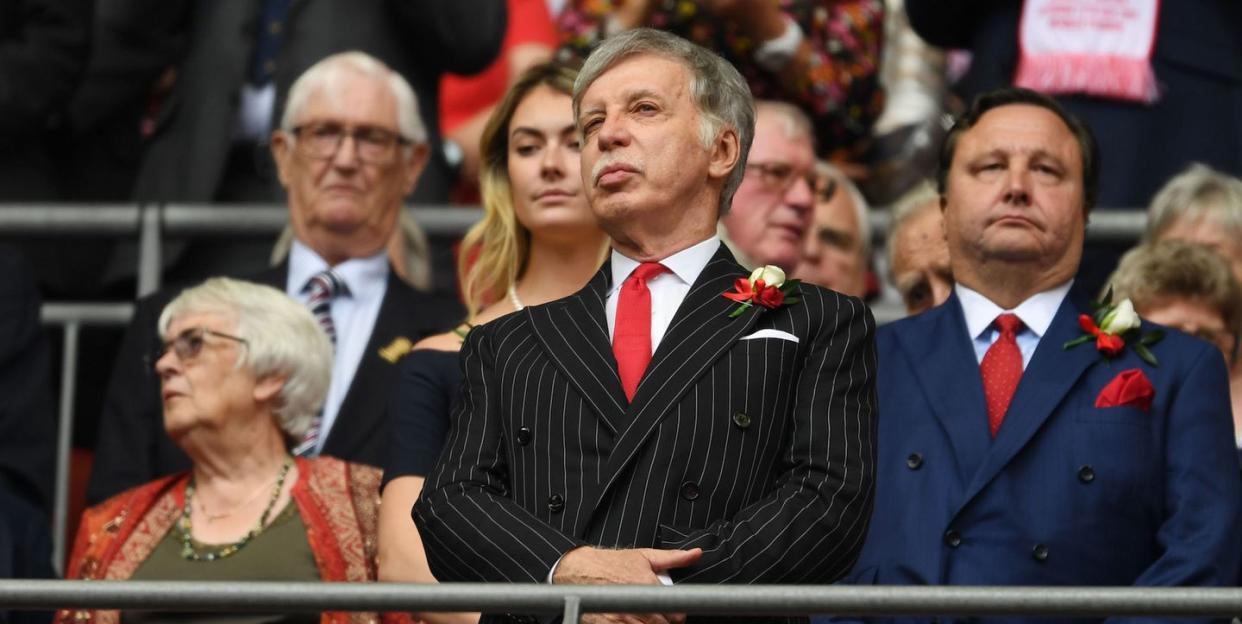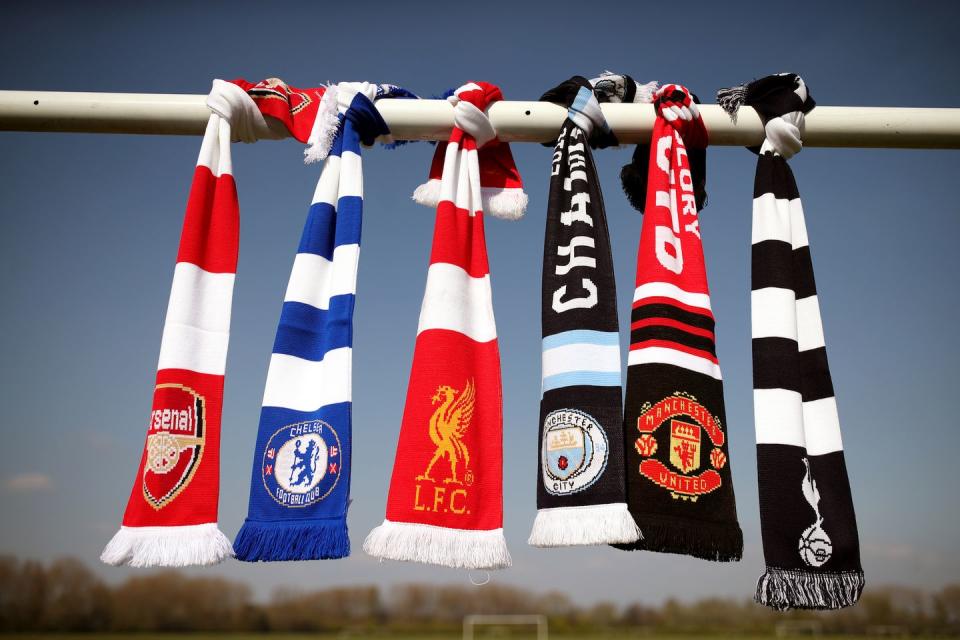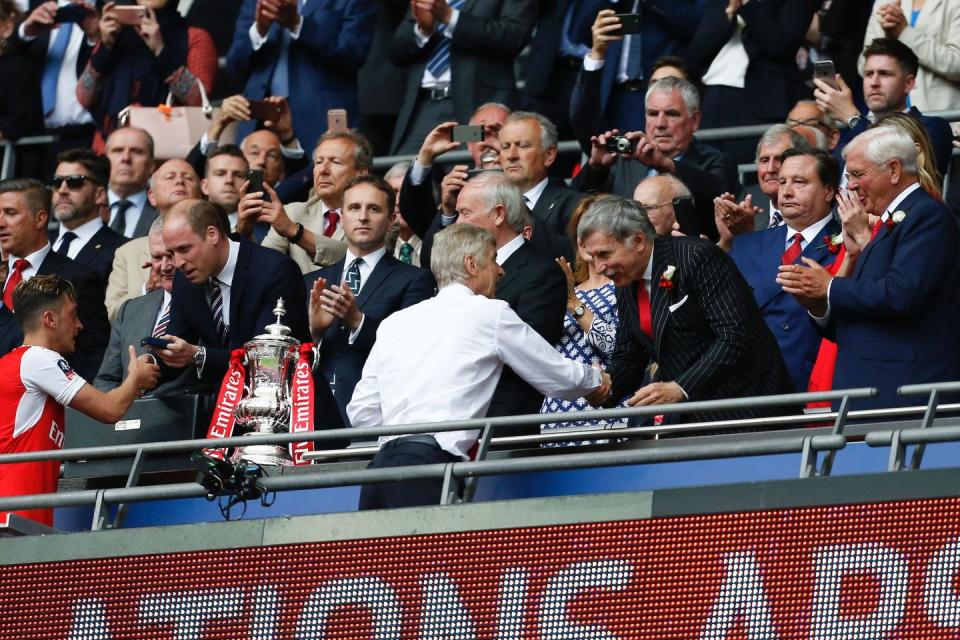The European Super League Is a Testament to Greed. For Arsenal, It's a Sporting Embarrassment.

“Hearst Magazines and Verizon Media may earn commission or revenue on some items through the links below.”
The first time I fell out of love with Arsenal Football Club was during the last season or two of Arsène Wenger's reign as manager, when the disappointments became something worse than shocking: they were predictable. The team would control the match by possessing the ball through superior technical skill and movement, indulging in some delicate, fleet-footed play in and around the opponent's box but somehow coming up short in one or two crucial moments. When it mattered most, they would falter and lose. The club became a mockery of its reputation as the sleek, modern footballing institution of London, a team so hopped up on class and cosmopolitan distinction that they too often forgot to put some tackles in and win the match.
At some point, my sadness calcified into indifference. I stopped watching matches, fed up with the monotony, until Wenger finally left after 22 years at the helm and a new coach at least offered the chance to fail in a new way. Little did I know that these were all just mile-markers on the long road of decline, a path that offered no way back to the glory days of Thierry Henry and Patrick Vieira. And little did I know that ultimately, the club would try to arrest that decline in such a way that I would soon find myself considering, again, whether it was worth devoting any time or energy to this institution at all.

On Sunday, 12 major European soccer clubs announced their intent to form a Super League, and the announcement has been met with general outcry from fan groups and beyond. Football Supporters Europe summed it up well in the New York Times, calling the idea "illegitimate, irresponsible, and anti-competitive by design," adding: "More to the point, it is driven exclusively by greed. The only ones who stand to gain are hedge funds, oligarchs and a handful of already wealthy clubs, many of which perform poorly in their own domestic leagues despite their inbuilt advantage." Some of Europe's top domestic leagues banded together to brand the proposal "a cynical project." UEFA, European soccer's governing body, called it "a project that is founded on the self-interest of a few clubs at a time when society needs solidarity more than ever." Faced with financial hardship driven by the pandemic, these sporting oligarchs have opted to build a New Zealand climate bunker for themselves.
The huge money involved here will make the rich richer and widen the gap between elite clubs and everyone else, even if the Super Leaguers promise they'll make "solidarity payments" to the plebeians. It'll trickle down! The structure will entrench the biggest clubs in positions of power regardless of whether they continue to win matches and earn that privilege. European soccer already has class divisions, but it is also built on a kind of meritocracy—and anarchic risk—that is anathema to U.S. sports. Your club can get relegated from your country's top league, condemned to the lower divisions, but you can also earn promotion to the top table and all the money and prestige that offers. (Imagine, for a moment, that the New York Jets could lose their spot in the NFL for being bad at football, and would have to earn their way back by being good at football.) It is rare, but not impossible, for the biggest teams to fall from grace. In order to compete in the Champions League, Europe's top club competition that runs parallel to the domestic league season, you have to finish in one of the top places in your country's domestic league, like England's Premier League. You have to earn it.

Unless you decide to just rewrite the rules, with the backing of JPMorgan Chase, to your own benefit. Because in that statement above from Football Supporters Europe, you might have noticed this line: "...a handful of already wealthy clubs, many of which perform poorly in their own domestic leagues despite their inbuilt advantage." Step right up, Arsenal Football Club, formerly mainstays of the aforementioned Champions League—consistently finishing among England's Top Four teams and earning the reward of playing against Europe's biggest in the likes of Barcelona and Bayern Munich—now sitting in ninth place in the English table. They could well finish farther down than that. And yet the club had the audacity to announce on Sunday evening that they were one of the founding members of a European Super League. It's one thing for Real Madrid to launch a Super League. It's another thing for what could end up being, this season, the 11th-best team in England—though they are Number One in stadium ticket price.
You can see why Arsenal were invited. A large existing fanbase, a powerful international brand operating out of one of the world's capitals, a history of top-level success. But there is an emptiness to this maneuver that can only be explained by the corporatization of the game, and not just any corporatization. This is American-style corporate governance. A number of the teams involved here—Manchester United, Liverpool, Arsenal—are now controlled by American billionaires who seem intent on bringing the Milton Friedman style of corporate behavior, so dominant in this country since the go-go 1980s, to the European soccer clubs they've acquired. The only prerogative for organizations run this way is to maximize shareholder value. There is no conception of corporate citizenship, except when it's useful from a legal standpoint to maximize their ability to spend huge sums of money to influence politicians. The idea that these clubs owe something to even their own (non-shareholder) fans, much less the fans of other clubs that could be decimated by this proposal, is in their view laughable. Don't want to get screwed? Then don't be somebody else. You should have been us.

The greed is relentless and all-consuming. It's not like many of these clubs are starved for cash under the current model. According to Reuters, Manchester United is projected to pull down $900 million in revenue the season after next, no Super League needed. The situation at Arsenal is less rosy. After years of absentee ownership where executives at Arsenal were allowed to engage in some ill-advised financial decision-making, and where the product on the field fell into a state of decay, owner Stan Kroenke—also of the Los Angeles Rams, with a net worth of $8.2 billion—has crashed back into the room like the Kool-Aid Man and flipped over the game board. After years getting shellacked playing chess, sinking from first or second or third in the league towards mid-table mediocrity, Arsenal will apparently just play checkers instead. Oh, and they'll start with a couple kings at their disposal. Good luck, West Ham. Get fucked, Leeds. Never mind that Arsenal have sunk down the table because historically lesser clubs have managed themselves better.
The whole thing is so disgraceful from a sporting perspective that it leaves me wondering whether I should continue to support this institution in any way. I already waste enough Saturday and Sunday mornings watching them crap the bed. Again, it's one thing for actual top teams to do this. It's greedy and destructive, but they do have some claim to the idea that many viewers tune into the Champions League to watch their teams, and that they deserve more of the revenue because of that. But Arsenal aren't in the Champions League. They don't deserve to be, and they haven't for quite some time. They are simultaneously pursuing a backdoor entrance into that competition, too—rather than qualify by finishing well domestically, they're trying to win a lesser European competition—the Europa League—and get a ticket that way. It's all shortcuts, though the latter avenue to increased revenue next season would at least involve winning something. This proposal would essentially replace the Champions League, a convenient option for a club that hasn't gotten an invite for half a decade. It's also a way to remove another chunk of the unpredictability that makes sports valuable in the first place, an exposure to the roiling chaos of reality that separates it from scripted entertainment.
Arsenal have long been known as an institution of class, one that behaved the right way in the surrounding community and did right by former players and current employees. Strangely, those traditions seemed to be at their height when the club's board of directors was controlled by various Lords and Ladies of the English gentry. (They had names like Lady Nina Bracewell-Smith and Sir John Chippendale "Chips" Lindley Keswick.) The board is now the domain of the Family Kroenke. (Stan's son, Josh, is now a major decision-maker at the club.) When the pandemic hit, the club soon pressured the players into a pay cut on the pretense that these young millionaires taking a little less would help the club avoid laying off other employees. And then they went ahead and laid off 55 employees. Because the Americans have arrived, and that stadium cook making $60,000 a year is cutting into the bottom line. Get rid of him, and then call up A.C. Milan about starting up that Super League. Why earn it by producing something valuable when you can just take it and nobody can stop you?
You Might Also Like

